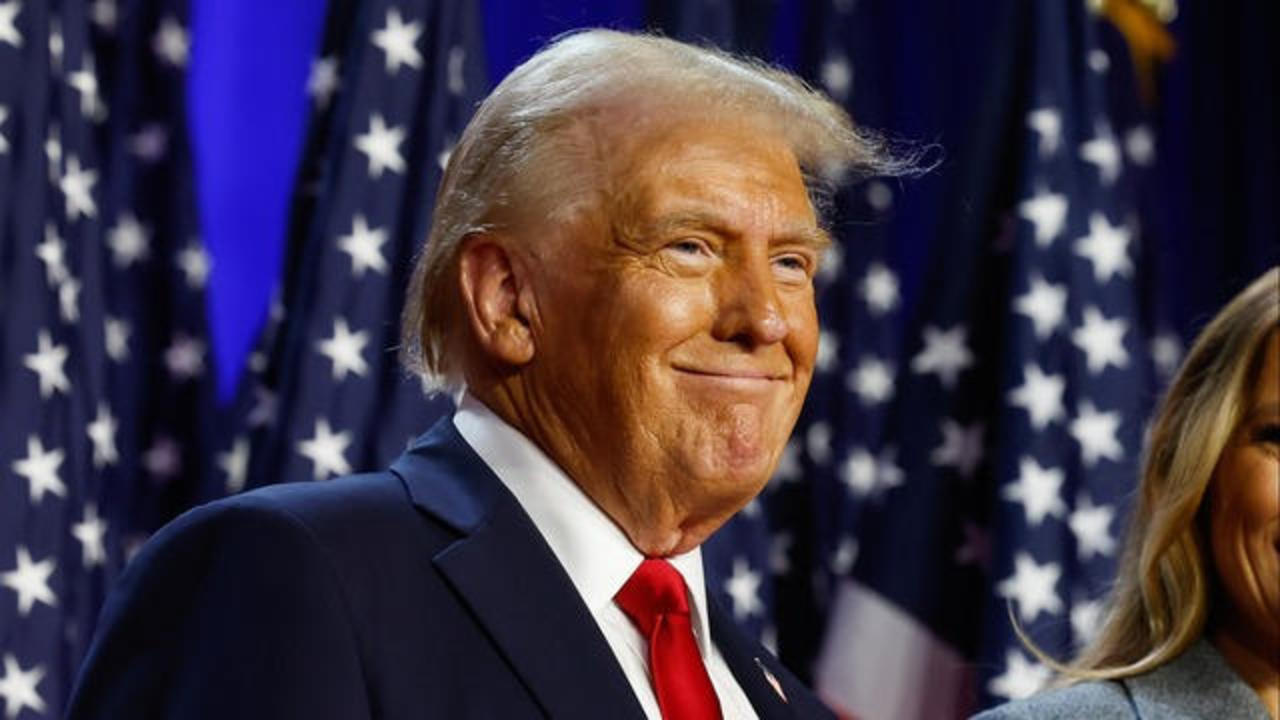- Donald Trump elected as 47th U.S. president, securing victory over Kamala Harris in a sharply divided nation. AP News
- Trump's victory includes notable gains in battleground states, flipping key areas like Pennsylvania and Wisconsin. Fox News
- Republicans gain control of the Senate, while the House remains undecided, positioning Trump to advance his agenda. Financial Times
- Trump plans significant policy moves, including possible tariffs, immigration actions, and reshaping U.S. alliances. New York Times
- Support from specific demographics shifted in this election, with Trump gaining among Latino and younger voters. BBC
Donald Trump's election victory is viewed by his supporters as a mandate for change, affirming his commitment to 'America First' policies. They see his win as a rejection of the previous administration's approach and a restoration of strong leadership on issues like immigration, the economy, and national security. This perspective emphasizes his ability to gain support across diverse voter demographics, including gains among Latino voters and younger demographics, reflecting a broadening base for his vision of American priorities.
Critics of Trump’s election victory express significant concerns about the future of American democracy, citing his record of challenging traditional checks and balances. This perspective highlights fears that his return to office could strain democratic institutions, as he may appoint loyalists who are less likely to uphold institutional norms. Observers within this viewpoint worry about the impact of his rhetoric on social stability and his approach to foreign policy, which could disrupt international alliances and lead to greater unpredictability on the global stage.
The international community is reacting cautiously to Trump's re-election, with allies and rivals weighing how his policies may affect their interests. Some leaders, such as Israel's Netanyahu, express optimism, seeing Trump as a strong ally, while European leaders suggest a need for the EU to strengthen its autonomy. This perspective underscores that Trump's foreign policy direction could intensify global divisions, with implications for trade, security partnerships, and the stability of multilateral institutions like NATO.
Details
Security
Bias
Deltas
The recent U.S. presidential election resulted in former President Donald Trump being declared the 47th president, marking an unexpected political comeback that has generated widespread national and international responses. Trump’s victory was significant, as he not only won over several battleground states like Pennsylvania, Wisconsin, North Carolina, and Georgia but also became the first Republican to win the popular vote since George W. Bush in 2004 ft.com bbc.com. Trump's election comes after four years of controversy, as he faced multiple legal battles, criminal indictments, and even a felony conviction apnews.com. His win is largely attributed to a strong coalition of voters across demographic lines, especially among men, non-college-educated individuals, and Latino voters, many of whom shifted their support to Trump from Democratic candidates nytimes.com bbc.com.
Trump’s administration promises to bring a renewed focus on his “America First” agenda, including policies on immigration, trade, and national security, which were central to his campaign rhetoric. He has proposed ambitious plans such as mass deportations, high tariffs, and a crackdown on illegal immigration, with his supporters viewing these initiatives as necessary to restore national stability and protect American interests ft.com. However, critics raise concerns about the broader impact of such policies on the economy and on relations with traditional allies theguardian.com. Furthermore, Trump’s victory speech at Mar-a-Lago signaled his intent to “fix everything about the country,” framing his win as a mission ordained by higher powers, which resonated with his base finance.yahoo.com. His influence within the Republican Party has only solidified, as Republican control of the Senate and a likely majority in the House provides him with a unified front to advance his legislative agenda without significant opposition ft.com.
The response to Trump’s victory has varied internationally, with allies and adversaries alike considering the implications for future foreign relations. Israeli Prime Minister Benjamin Netanyahu congratulated Trump, emphasizing the strengthening of Israel-U.S. ties amid ongoing conflicts in the Middle East apnews.com. Meanwhile, some European leaders suggested that the European Union might need to strengthen its independence to counterbalance the anticipated unpredictability in U.S. foreign policy under Trump’s leadership ft.com. In Ukraine, there is cautious optimism that Trump’s “decisive leadership” may help accelerate peace negotiations with Russia ft.com. Observers have noted that Trump’s relationships with leaders of authoritarian regimes, such as those in Russia and North Korea, coupled with his critical stance on NATO, could reshape the global order nytimes.com.
Domestically, Democrats face an internal reckoning, as Kamala Harris’s defeat has sparked discussions about the party’s future direction. Harris’s campaign struggled to differentiate her platform from that of her predecessor, President Joe Biden, whose approval ratings were a liability to her candidacy. The election revealed a shift in voter priorities, with economic issues like inflation and immigration taking precedence over social issues that Democrats had championed, such as abortion rights apnews.com. Harris’s significant support among Black, Latino, and young voters saw a slight decline, reflecting the challenges Democrats face in retaining these crucial demographics while contending with voter dissatisfaction about the economy and the direction of the country bbc.com. With a slim geographic footprint and several lost Senate seats, the Democratic Party must now rebuild a coalition that can counter Trump’s popularity and appeal across varied voter bases apnews.com.
As Trump prepares to re-enter the White House, questions arise about how he will navigate ongoing legal challenges and the potential influence of loyalists appointed to key government positions. Former Attorney General Bill Barr suggested that pending federal cases against Trump should be dismissed, noting that the American electorate had rendered its judgment by re-electing him, though certain state cases may continue foxnews.com. Trump has expressed intentions to overhaul the justice system, potentially restructuring it in ways that critics argue could undermine its independence nytimes.com. As he assumes office in January 2025, Trump’s return is set to bring both significant policy shifts and heightened scrutiny, marking the start of what many expect to be a pivotal era for both the U.S. and the global stage finance.yahoo.com.
Negative
Sentiment

The article reports Trump’s speech and acknowledgment of victory straightforwardly, with quotes on his promises for America's 'golden age' but lacks additional commentary that would suggest either endorsement or disapproval.
Read full article
The article reports Trump's remarks and plans in a straightforward manner, avoiding any commentary that could imply a clear stance, instead delivering the facts of the event.
Read full article
The article outlines the electoral vote counts and candidates’ standings without additional remarks, presenting a balanced report on the ongoing election.
Read full article
Neutral
Sentiment
The article describes Trump's victory as a 'guaranteed' win and lists congratulatory messages from international figures like French President Macron and Israeli Prime Minister Netanyahu, suggesting admiration for Trump’s success and leadership style.
Read full article
The article frames Trump's victory as a historic and 'extraordinary honor' for America, underscoring his commitment to national prosperity and peace. It presents Trump as a figure capable of transformative leadership.
Read full article
The article highlights Trump's 'extraordinary political comeback' and connects his background in finance and real estate with his readiness to lead, adding context that suggests Trump’s past achievements bolster his leadership credibility.
Read full article
The article highlights Trump’s high confidence in surpassing the electoral vote threshold and lauds his significant support, implying his leadership is widely valued and that his administration will be impactful.
Read full article
The article reports Trump’s election as an unprecedented 'political victory' and mentions his early support from influential world leaders, suggesting widespread international respect for his leadership and vision for America.
Read full article

The article highlights Trump’s optimistic message to his supporters, portraying him as a leader with a strong vision for America’s prosperity, though it stops short of overtly endorsing him.
Read full article

The article frames Trump’s promises as beneficial and emphasizes his relationships with major figures in business, suggesting admiration for his leadership approach and alliances.
Read full article
The article emphasizes Trump’s celebratory speech and his claim of making history, presenting his victory as a monumental achievement.
Read full article
Positive
Sentiment
-
+
Kommersant [Russia] Adds International Congratulatory Messages
Kommersant highlights congratulatory messages to Trump from global leaders like Macron and Netanyahu.
Western sources did not focus on international responses to Trump’s victory. -
+
Sputnik Kazakhstan [Kazakhstan] Adds Trump's Business Background
Sputnik emphasizes Trump's early achievements in finance and real estate.
Western articles did not delve into Trump’s business history as extensively. -
+
Pengpai News [China] Adds Trump's Pledge to Stop Wars
Pengpai quotes Trump’s commitment to ending wars during his term.
Western media did not prominently mention this commitment. -
+
Sawa News [Middle East] Adds Details on Security Measures
Sawa News covers heightened security at polling stations.
Western media did not emphasize these specific security protocols. -
+
The Paper [China] Adds Focus on Economic Plans
The Paper discusses Trump’s intentions to boost the U.S. economy and reduce national debt.
Specific economic goals were not heavily emphasized in Western articles.
-
-
CNN [USA] Omits Trump's Support from Global Leaders
CNN’s article omits the mention of foreign leaders congratulating Trump.
Russian sources included details of international support, which are missing in CNN’s coverage. -
-
BBC [UK] Omits Focus on Trump’s Business Background
BBC's report does not discuss Trump’s history in finance or real estate.
This background detail was included in Russian and Chinese sources, particularly highlighting Trump’s achievements. -
-
Fox News [USA] Omits Security Measures During Election
Fox News does not cover the security measures at U.S. polling stations.
Middle Eastern sources mentioned these efforts, but they were not highlighted by Fox. -
-
NBC [USA] Omits Trump's 'Golden Age' Promise
NBC does not prominently feature Trump’s pledge of a ‘golden age’ for America.
This detail was mentioned in multiple non-Western articles but not emphasized in NBC’s report. -
-
Al-Sa'a [Middle East] Omits Electoral Challenges Faced by Trump
Al-Sa'a does not discuss the close race or electoral challenges.
U.S. sources provided details on the competition between Trump and Harris, which is not mentioned in Al-Sa’a’s coverage.


